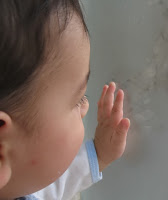Announce & Wait –
a Caveat:
it takes a minute or so. . .
it takes a minute or so. . .
The feedback on the post Announce & Wait has made me
realize that not all people are starting this kind of parenting thing from the
earliest days of their parenting life, and many people have a history of not-this-kind-of-parenting
… which makes some of the suggestions look like they don’t ‘work’.
In case you don’t feel like wandering over and reading the related piece, that post is essentially a suggestion for how to have more peaceful cooperation with things like toothbrushing, diaper changes and getting ready to leave the building when it’s -73°C outside: gather everything you need, go to where you need to do it (at the door, on the floor near the changing pad, or on the way to the washroom with the toothbrushes in it) saying --to someone whose full attention you actually have--‘I’m going to brush your teeth [or whatever] now…’ and wait. Stay still, don’t say anything, and really don’t say it again. Just wait. Meditate. Everyone needs more opportunities to focus on staying in the moment. Every parent I have ever met wishes for more uninterrupted time to be themselves in … what a wonderful free moment you are being given, until the little one processes the information, sorts out what they want to do, and comes to go along with your plans.
In case you don’t feel like wandering over and reading the related piece, that post is essentially a suggestion for how to have more peaceful cooperation with things like toothbrushing, diaper changes and getting ready to leave the building when it’s -73°C outside: gather everything you need, go to where you need to do it (at the door, on the floor near the changing pad, or on the way to the washroom with the toothbrushes in it) saying --to someone whose full attention you actually have--‘I’m going to brush your teeth [or whatever] now…’ and wait. Stay still, don’t say anything, and really don’t say it again. Just wait. Meditate. Everyone needs more opportunities to focus on staying in the moment. Every parent I have ever met wishes for more uninterrupted time to be themselves in … what a wonderful free moment you are being given, until the little one processes the information, sorts out what they want to do, and comes to go along with your plans.
That is the suggestion in that post. It works.
However . . .
Think of all the other ways people are told to ‘encourage’
kids to do things the kids don’t necessarily want to do or agree are very
important. Toddlers don’t understand ‘cavities in 18 months’ or ‘frozen flesh
warnings.’ Parents do, which is why they get to be in charge of the hygiene and
safety stuff.
When you’re just entering the ‘I don’t want to do what you
want to do because you want to do it’ stage with, say, a 14- or 18-month-old
child, starting with this approach before any other approach is attempted makes
it ‘work’ –peacefully, and at least as effectively as anything else anyone
suggests, but again: peacefully, which isn’t how most command-and-control,
coercion, or orders –sorry ‘opportunities for cooperation’—usually turn out.
How Orders [ahem . .
. opportunities to cooperate] Turn
Out
Even if they work, there are natural responses to ordering
people around, and pretty much every parent looking for ideas for how to make
their days go more smoothly have ample evidence of what those responses look
like:
 Is my child deaf? I swear she
could hear a moment ago when I unwrapped a chocolate bar… three rooms away
behind a door. . .
Is my child deaf? I swear she
could hear a moment ago when I unwrapped a chocolate bar… three rooms away
behind a door. . .
I am SO
tired of the word ‘no,’ it is all the kids ever say. . .
I don’t have the energy to chase
the child around the house every time we need to do something. . .
Oh, great, I don’t have time for
another temper tantrum right now, we need to GOooooo!
Sometimes people think I’m talking about kids’ reactions.
Kids’ reactions are just their response to what is happening
around them, to them, and within themselves. That’s all perfectly natural. It’s
also inevitable and unchangeable from the outside.
The reactions that aren’t ‘working’ for the parents are the
parent’s: impatience, frustration, irritation, martyrdom, hopelessness,
exasperation, desperation, depletion and burnout.
Often parents see the kids’ behaviour as the driving force causing
these responses, which is pretty usual in a culture that shames anyone
responsible for anything, and encourages people to evade blame at all costs.
However. . .
A great friend who has renamed herself Talloolah in the
tradition of Wise Women everywhere who step outside the mainstream, says
‘expectations are just planned disappointments.’
Another friend, who proudly calls herself a Crone, says ‘that’s not just asking for frustration, that’s ordering it.’
Another friend, who proudly calls herself a Crone, says ‘that’s not just asking for frustration, that’s ordering it.’
I segued away there to pave the way to say something rather
counter-culture:
choose your action, choose your response
Am I saying that parents are asking for frustration and
irritation and burnout on purpose? Absolutely not. Am I saying that they are
doing it without realizing it, and often without any awareness of what is
happening? You bet!
By choosing
your action, you are choosing your response
If you
order another human being to do your bidding, you are choosing resistance. It’s
basic human nature, and while there are unicorns in the world who might comply
instantly for fun or because the sun is up, the chances of you having given
birth to one (or adopted one, or had one assigned to your classroom or sign up
for your daycare services) are kind of remote. They aren’t called unicorns
because they are everyday horses –or because they are people.
If you nag
a human being to do what you want when they clearly are doing something else,
you are choosing frustration AND resistance. It’s basic human
nature. Humans do not like being told what to do, and when the resistance to being
ordered around becomes second-nature, humans will not do what they want to do if they think it aligns
with what the authority wants them to do. This is the basis of a lot of
‘forgetting’ and procrastination. Repeating the order is just irritating to everyone.
If you
interrupt a human being with what you believe is more important (to you) than
what is important to them, you are choosing exasperation. It is
basic human nature. People of all ages naturally resist having other people
choose their priorities.
The Long
Way to Say: announce and wait ‘works’
. . .when the person involved trusts your motives
It is hard to hear that the reason your child does not
respond to your communication openly and eagerly . . .
. . . it is hard to hear that this is about trust and
connection.
Resistance to you and your words is not built on trust, it’s
built on command-and-control parenting styles. Even ‘peaceful’
command-and-control styles. The thing about human nature is that the words
don’t matter. At all. Call is ‘peaceful’ if you want to, if it is coercive,
command-and-control, the resistance you encounter will be the truth of the
situation. Call it ‘attachment’ when you leave the baby with a total stranger
for something ‘important’ and the baby will still be freaked out by the
stranger. Call it ‘logical consequences’ and the child will perceive it as the
punishment that it is, because it is imposed in response to ‘poor choices’
(read: adult-determined ‘bad behaviour’) and never to ‘good choices.’ That is
how you can always tell it is not ‘natural’ consequences, because the universe
supplies those quite without fear or favour, regardless of what anyone ‘meant.’
This is not about
‘bad’ parenting. That’s a value judgement that people take personally,
naturally resist, and isn’t helpful in any context.
It is about
taking bad advice –sometimes without thinking about it at all, sometimes
because of where it came from (our own childhoods, often) and sometimes because
of how delightfully convenient and simple it would be if it did work.
Bad advice is the kind that can’t work because it fails to
accept reality as a premise. Coercive, command-and-control parenting advice is
like that: it can’t work because: people.
 This is about the problem with following age-old (and
sometimes new-sounding) advice that disregards basic human nature because …
well, I don’t really know why it disregards basic human nature.
This is about the problem with following age-old (and
sometimes new-sounding) advice that disregards basic human nature because …
well, I don’t really know why it disregards basic human nature.
Maybe because for a really long time, kids have not been
thought of as really human.
Maybe because it sounds
like it should work.
Maybe because it feels like it would be faster if you could
just activate the Voice Command Software and have a smooth-running,
adults-deferred-to, convenient ‘the Queen is in charge of the Universe and the time
at which other people wash their faces’ house…
I don’t really know what is the impetus behind disregarding
basic human nature in favour of the stories around ‘you should be able to
control your kid’ and all the advice that sounds like that … but I do know it is
fantasy fiction.
Sure, if people weren’t people, maybe it would work.
If kids weren’t people, maybe it would work.
It doesn’t work.
Because: people.
And the length of time the sun is visible in the sky does
not change based on the number humans decide to put on their clocks, and there
is no ‘daylight’ to ‘save’ by changing them. Not sure why that bit of weirdness
ever took hold, either, but here we are: daylight hours in the Northern
hemisphere shorten through October and November, just as they are lengthening
in the Southern hemisphere and staying completely the same at the equator
–let’s all change the clocks and pretend something else is happening because …
then children will have Voice Command Software and they will magically stop being
human and stop resisting being controlled by … um … nah.
It’ll never work.
What is the Caveat?
The caveat to Announce-and-Wait is that in a place where
kids are used to being, expecting to be, and have a lot of experience being
ordered around (sorry I meant so say: motivated to comply / encouraged to
listen… but really: ordered around), they will absolutely not magically
‘perform’ differently in the face of one simple change of a parent’s behaviour
in this instance. It will ‘work’
–just not right away, and maybe not at all today.
Because this is about trust.
Trust is messy, because people want to control what other
people think and feel … and that urge alone damages trust.
Wanting other people to trust you feels controlling to them,
and that damages their ability to trust you.
This Relationship
Thing is COMPLICATED!
As much as we want to feel capable and in control, the
simple reality of relationships is phrased the way a late friend put it:
This is
me
That is
you
All the ‘this is me’ stuff we are in control of is:
1.
our words and,
2.
our
actions.
We don’t control our thoughts, emotions, the world around
us, the weather on Europa or what other people think of us or what they think
about what we do.
All the ‘that is you’ stuff we are in control of is this list
here:
1.
. . .
Even in our own very young children, we cannot control the
impact we have on them, what they think about what we do or say, how they
understand what we do or say, what they think our actions and words mean about
them and their value as people, or how much they trust or respect us.
One more time for the people in the back: we do not get to decide what impact our actions and words have on other people.
We do not control what they think about us, or about
themselves when we are affecting them.
When we make changes, of any kind really, we are not the
people who get to decide how those changes will be perceived by others. We
don’t get to decide that we have sufficient authority for others to go along
with those changes instantly, or to respond to those changes immediately the
way we expect them to or how we hope they will.
Announce-and-wait is not magically different.
It takes patience, to allow the other people to see that you
really mean it, and this isn’t some new trick you’ve discovered to make them
compliant a new way.
It takes time to rebuild trust that you really are not
trying to control them, that they really are free and that you really will wait
for them to be ready to do that thing you want them to do.
As I said: change is hard. It works, but not instantly like
a Polaroid picture (which also takes a minute…)
























